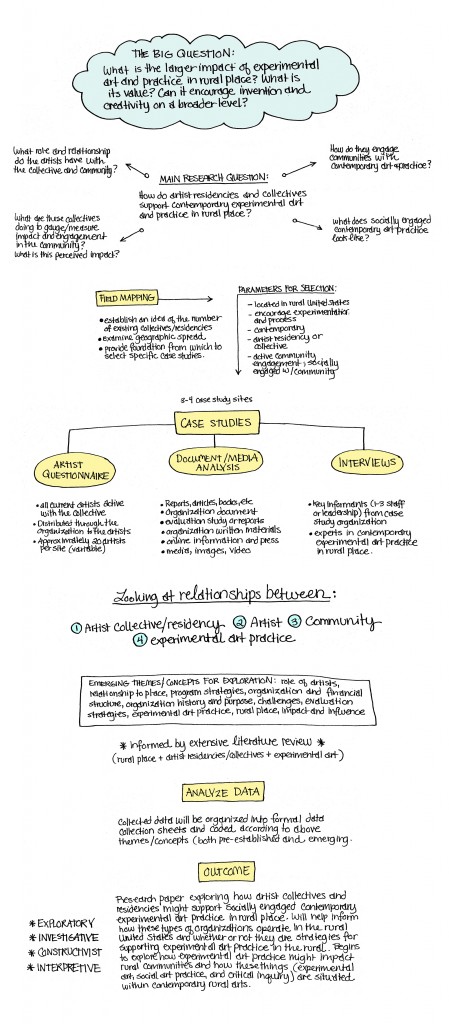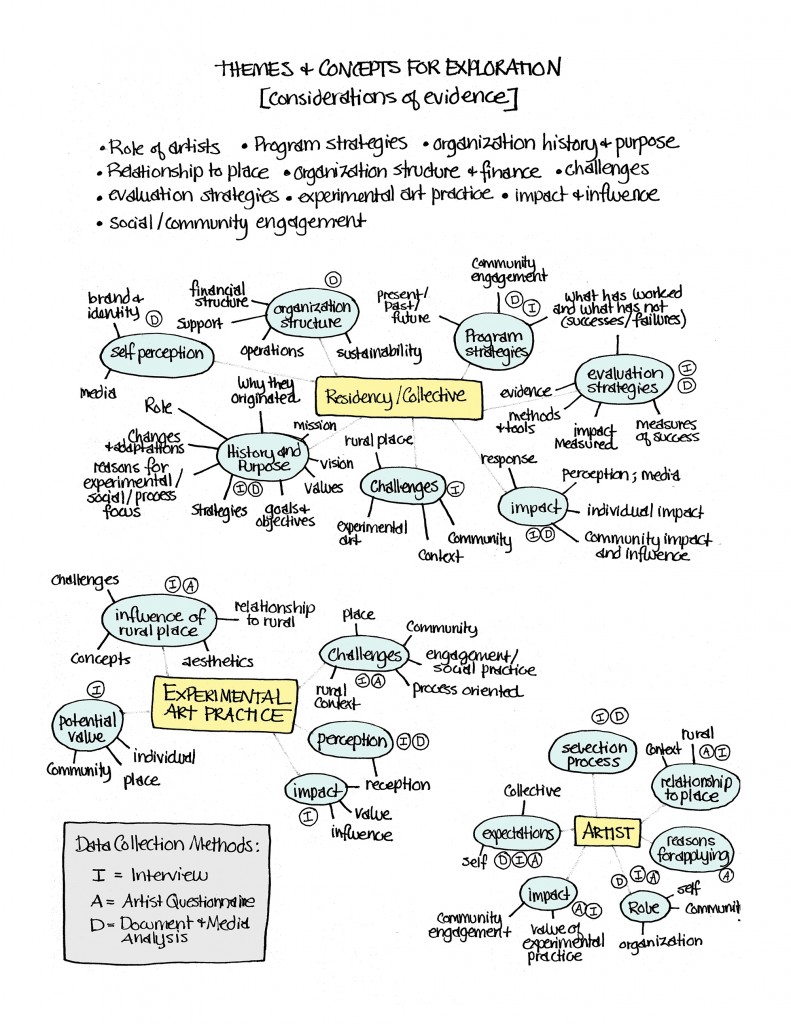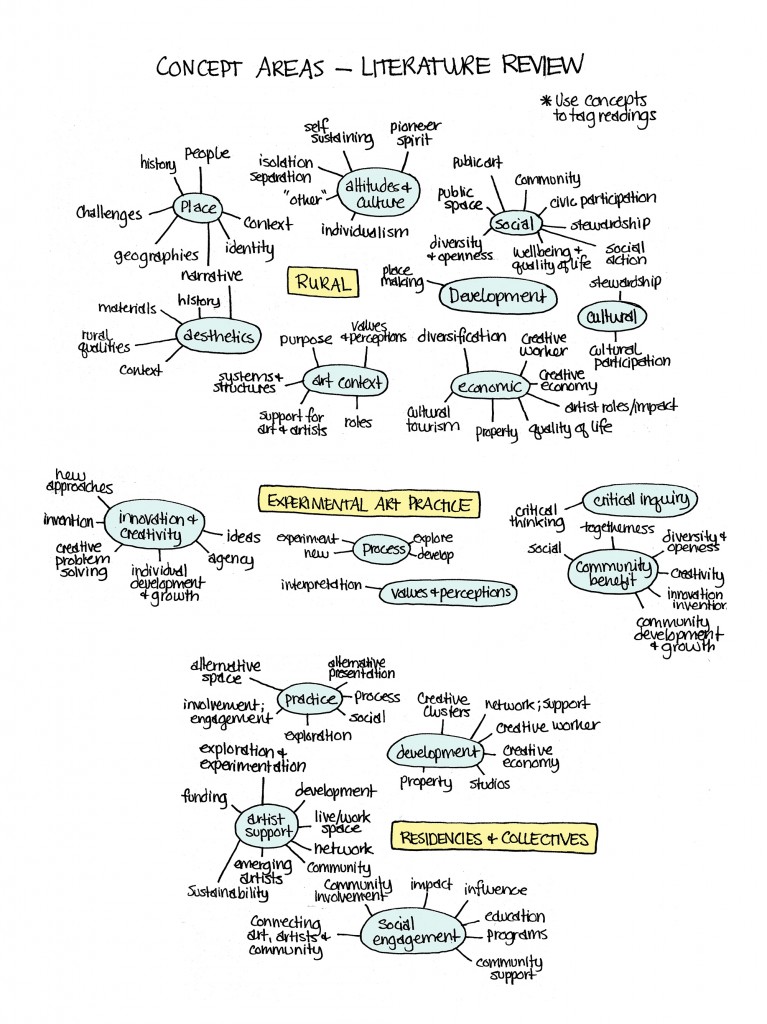Experimental Contemporary Art in Rural Place
A study of rural artist residencies and collectives
Research Proposal
A continuation of graduate research leading to the formation of a finalized research proposal. http://blogs.uoregon.edu/aad631/
Proposal for Graduate Research Project_Stacey Ray
Research Methods
This course was designed to introduce a range of research methodologies and methods of importance to the field of arts administration. In this course, students explored the language, process, and dimensions of research. Students developed critical thinking and writing skills useful in retrieving, storing, and managing information for the research proposal/process. Students also compared and contrasted a variety of research approaches in order to identify, describe, and develop elements of a research proposal toward satisfying the research component of the Arts and Administration program degree.
Analysis of AAD Graduate Research_Stacey Ray
Research Techniques_Case Study & Interview
ASSUMPTIONS OF CREATIVE PLACE_Literature Review
Preliminary Research Proposal_Contemporary+Rural+Community
Research Methods Learning Objectives:
I met with second year student Chelsey Trujillo who is working on her terminal masters research project, answering the question of how community arts organizations utilize third space as a tool to create authentic engagement. The four “sub-questions” of her research project were centered around structures, engagement, experiential programming and constructed space. Chelsey talked with me about what she learned along the way, the two research methodologies she chose, and how she collected information. She chose to do a literature review of one organization that already identified as third space (an exemplary example), and collective case studies of two other organizations that were utilizing third space but that did not identify as a third space organization. Through these methodologies she is able to compare how arts organizations may be utilizing third space, as there is very little current research on the topic, especially in regards to identification and tangible utilization. From my conversation with Chelsey I was able to delineate my own learning objectives for the Research Methodology course:
I want to become very familiar with all of the resources available for research as well as how to use them, and what role they might play in my process. I know that outside sources will help lead me through my question and clarify my research as I move along so I want to leave the course with a good understanding of possible source material and where I can collect it.
Reflection: I feel much more confident navigating library materials and the web for materials. I also have a good list of tools to use for searching for sources, gathering and organizing sources as well as where to go for other resources including possible research funding and equipment rentals. I was surprised that I had never before thought about looking at other bibliographies as I go along. I have a much better understanding of “peer-reviewed” sources and the broad range of material that might be used in research.
Beyond collecting resources, I want to have a good grasp on how to organize that material for easier analyzing and reference. I have found out in the past that research can sometimes lead you to mountains of material and the most important skills to have are time management and abilities to organize.
Reflection: I am not sure that I gained the skills to actually organize material but I do feel better equipped to handle this than I was before. I think at least the clarification that I don’t have to read the whole book or article was really beneficial. I now know where to look to find out if the source is valuable, how to gauge its importance and how to annotate it and/or “catalog” it in my notes once finished with it. I also gained knowledge of specific tools to organize all of this information.
By the end of the course, I want to be much more comfortable with the research process. Chelsey talked to me a lot about how a researcher must stay flexible, allow for change, and understand that the process is not linear, the steps are not necessarily clear, nor do they go in order.
Reflection: Compared to when I started, I feel much more comfortable with the idea of research and the methods involved. The type of research that we explored was very different than what I had done in the past which had been more or less a very extensive literature review. I have a solid understanding of research methodologies, methods and the research instruments involved, as well as how to construct those and utilize them. The process makes a lot more sense to me now than it did and I do not feel nearly as intimidated. I understand that it is very flexible, but now I know the reasons why that is. Research is an organic process of discovery….fueled by discovered knowledge and understanding that we gain as we go along. The research informs the literature, and the literature informs the research. It constantly evolves and builds on itself.
Most of the research that I have done in the past has been strictly literature based. It is important to me that I learn about all of the research methods and instruments that could be utilized and formatted to my research. I want to be able to recognize and analyze their role in other research as well.
Reflection: As mentioned above, I have much greater knowledge of specific research methods and methodologies than I did before. Not only do I understand the differences between quantitative vs qualitative research but I now understand the specific methods and instruments within each, what they are able to do and why they are valued. While I certainly won’t be able to remember everything that we talked about all term, I feel equipped with some really strong resources….and a very helpful guidebook.
The idea of formulating a research topic or question can be a daunting task. I hope to be able to at least begin narrowing down my possible topic, with the understanding that this could change, and have a good handle on how to go about this process of simplifying my topic and my methodology.
Reflection: I was surprised at how quickly I surmounted this challenge. I learned how to think about the idea of the research question…what it serves to do and how we, as the researcher, get to the final question. I learned that this process is very flexible and can sometimes change, but that it is very important because it sets the foundation for all of the methods which build out from it. I feel confident in developing a research question, identifying its motives and using those motives to determine the specific methods by which to answer the question.
I want to have a better understanding of myself as a researcher, and what my role is within my research.
Reflection: This is still slightly blurry to me, likely because I have not really gotten to the point of really analyzing myself in regards to my research (it is still early on), but I am much more aware of the issues of bias and ethics that must constantly be in mind when doing research. The course has absolutely made me much more conscious of what research is, what it serves to do, and the role of the researcher throughout the process and within the final product.
Lastly, it is important that I begin to clarify the purpose of research for myself within my career. How will it be applicable for me after graduation? How can I take the skills and knowledge from this course and apply it in a general sense after my academic experience? How might it be applied to my career?
Reflection: I believe that I have started to piece this together. I feel much clearer about the role that research might play in my work and learning. This is likely something that will not be fully clear for awhile but I understand now that research doesn’t have to be tied to this sort of “academic” space, but rather it is a way of navigating and contributing to the field within which you work. I also think that it is a way of fueling your passion, education and experience within a specific area, allowing you to continue grow and evolve, and possibly even contribute to a larger body of knowledge that might affect another’s work.


